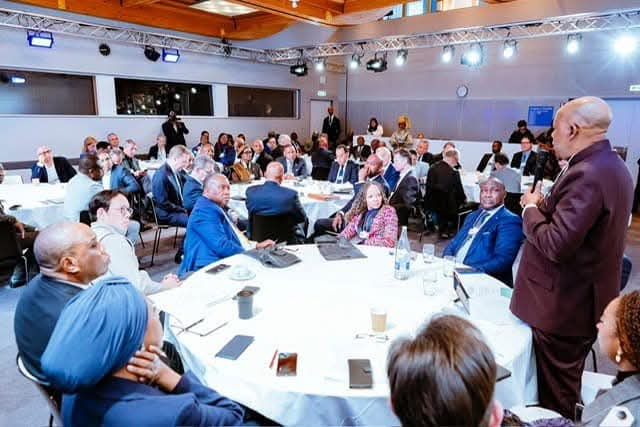By: Daure David
The Vice President Kashim Shettima of Nigeria has joined global leaders in a bold push to fully implement the African Continental Free Trade Area (AfCFTA), with a vision of growing Africa’s economy to a staggering $29 trillion by 2050. This ambitious target was reiterated at a key forum on the sidelines of the 2025 World Economic Forum (WEF) Annual Meeting in Davos, Switzerland.
During the “Forum Friends of AfCFTA: Turning Digital Trade into a Catalyst for Growth in Africa” session, Vice President Shettima emphasized Nigeria’s commitment to driving the AfCFTA agenda, which is seen as a powerful tool for Africa’s digital transformation and economic integration. He highlighted the continent’s potential to leverage its growing digital sector as a catalyst for prosperity, stressing that Nigeria is poised to lead the charge in tapping into the enormous market opportunities presented by the AfCFTA.
The World Economic Forum President, Børge Brende, also underscored the transformative potential of AfCFTA, noting that its full implementation could unlock vast economic growth for the continent. “AfCFTA can be a game changer for Africa, with the potential to boost the economy to $29 trillion by 2050,” Brende remarked.
The forum brought together a diverse group of leaders, including Presidents Cyril Ramaphosa of South Africa, Duma Boko of Botswana, Félix Tshisekedi of the Democratic Republic of Congo, and Hassan Sheikh Mohamud of Somalia. Other notable attendees included Prime Minister Mostafa Madbouly of Egypt, Confederation of African Football President Patrice Motsepe, and former British Prime Minister Tony Blair. A significant presence of global CEOs also lent weight to the event, signaling strong international backing for the AfCFTA initiative.
Shettima, in his address, pointed to Africa’s unique demographic advantage, with a youthful and growing population that offers an untapped source of talent in a world facing increasing human resource shortages. A Korn Ferry study forecasts a global talent deficit of over 85 million people by 2030, positioning Africa to be a key player in the global economy as it continues to strengthen its digital capabilities.
“The global economy is increasingly reliant on technological innovation, and Africa’s young population is well-placed to drive this change,” Vice President Shettima stated, adding that Nigeria’s expanding digital landscape and tech ecosystem are vital in the continent’s march toward a knowledge-based economy.
As the continent looks ahead to 2050, the AfCFTA is viewed as a pivotal driver of economic integration, market expansion, and digital innovation. Leaders at the forum expressed a shared vision of creating a more connected, prosperous Africa, with the potential to not only transform the continent’s economy but also shape the future of global trade.
With the combined leadership of Nigeria and other African nations, along with the backing of global partners, the AfCFTA is set to become a cornerstone of Africa’s economic development in the coming decades.







